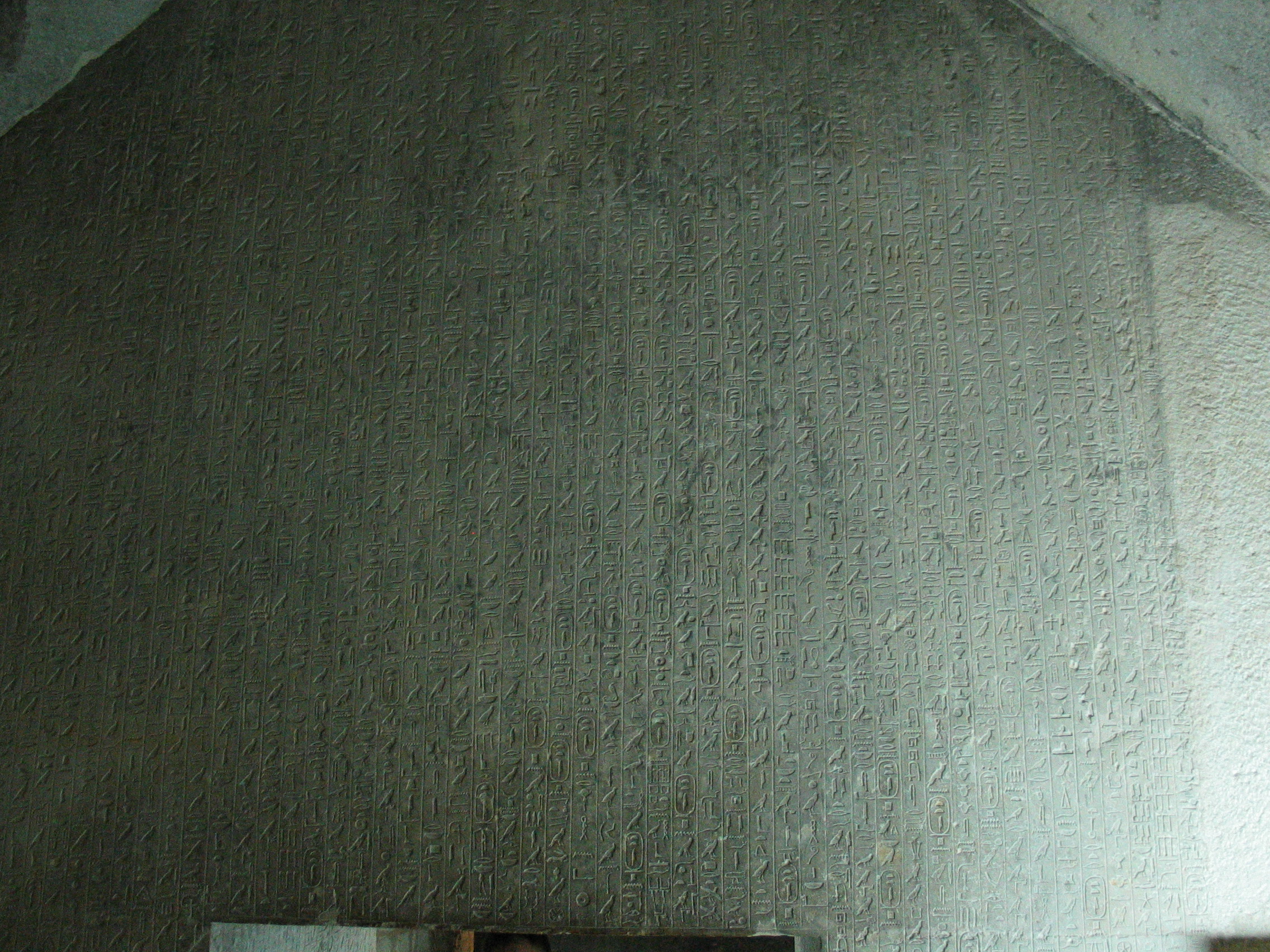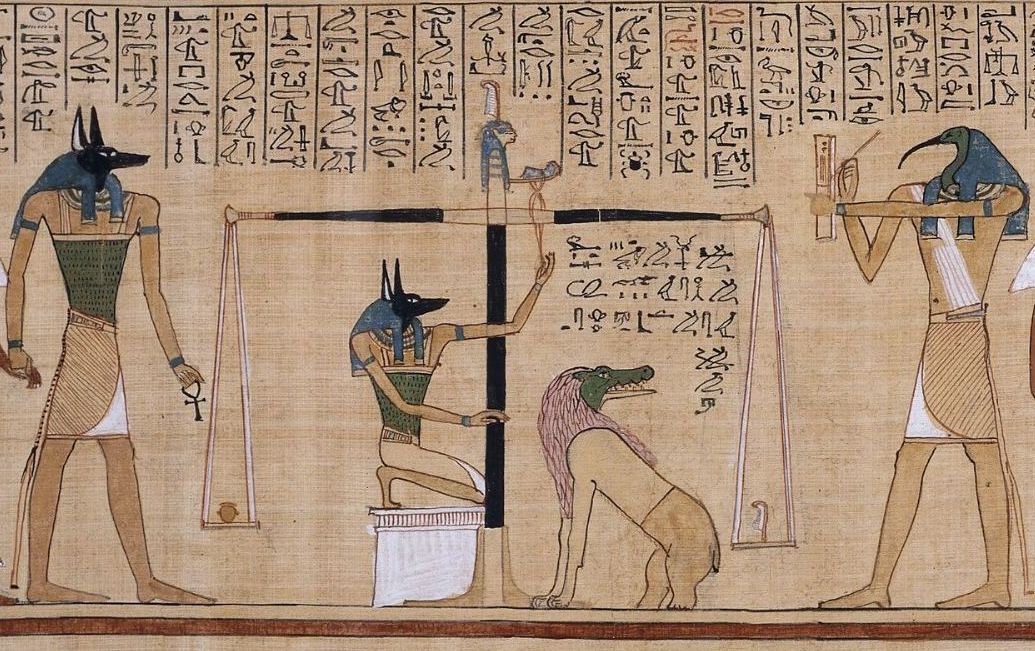|
Maat Kheru
Maa Kheru ( egy, mꜣꜥ ḫrw) is a phrase meaning "true of voice" or "justified"Allen, James P. (2000). ''Middle Egyptian: An Introduction to the Language and Culture of Hieroglyphs''. Cambridge University Press. p. 95 or "the acclaim given to him is 'right'". The term is involved in ancient Egyptian afterlife beliefs, according to which deceased souls had to be judged morally righteous. Once the soul had passed the test, the Weighing of the Heart, they were judged to be ''mꜣꜥ ḫrw'' and was allowed to enter the afterlife. The phrase was often used to denote someone who had passed and become a god by placing it at the end of the name of the individual in question. As such, it is frequently found in inscriptions in Egyptian tombs and royal mortuary temples, especially as part of an introductory clause for autobiographical inscriptions celebrating the tomb or temple owner's achievements in life. See also * Maat Maat or Maʽat ( Egyptian: mꜣꜥt /ˈmuʀʕat/, Coptic: ... [...More Info...] [...Related Items...] OR: [Wikipedia] [Google] [Baidu] |
Ancient Egyptian Afterlife Beliefs
Ancient Egyptian afterlife beliefs were centered around a variety of complex rituals that were influenced by many aspects of Egyptian culture. Religion was a major contributor, since it was an important social practice that bound all Egyptians together. For instance, many of the Egyptian gods played roles in guiding the souls of the dead through the afterlife. With the evolution of writing, religious ideals were recorded and quickly spread throughout the Egyptian community. The solidification and commencement of these doctrines were formed in the creation of afterlife texts which illustrated and explained what the dead would need to know in order to complete the journey safely. Egyptian religious doctrines included three afterlife ideologies: belief in an underworld, eternal life, and rebirth of the soul. The underworld, also known as the Duat, had only one entrance that could be reached by traveling through the tomb of the deceased. The initial image a soul would be presented ... [...More Info...] [...Related Items...] OR: [Wikipedia] [Google] [Baidu] |
Weighing Of The Heart
Ancient Egyptian afterlife beliefs were centered around a variety of complex rituals that were influenced by many aspects of Egyptian culture. Religion was a major contributor, since it was an important social practice that bound all Egyptians together. For instance, many of the Egyptian gods played roles in guiding the souls of the dead through the afterlife. With the evolution of writing, religious ideals were recorded and quickly spread throughout the Egyptian community. The solidification and commencement of these doctrines were formed in the creation of afterlife texts which illustrated and explained what the dead would need to know in order to complete the journey safely. Egyptian religious doctrines included three afterlife ideologies: belief in an underworld, eternal life, and rebirth of the soul. The underworld, also known as the Duat, had only one entrance that could be reached by traveling through the tomb of the deceased. The initial image a soul would be presented w ... [...More Info...] [...Related Items...] OR: [Wikipedia] [Google] [Baidu] |
Afterlife
The afterlife (also referred to as life after death) is a purported existence in which the essential part of an individual's identity or their stream of consciousness continues to live after the death of their physical body. The surviving essential aspect varies between belief systems; it may be some partial element, or the entire soul or spirit of an individual, which carries with it and may confer personal identity or, on the contrary, nirvana. Belief in an afterlife is in contrast to the belief in oblivion after death. In some views, this continued existence takes place in a spiritual realm, while in others, the individual may be reborn into this world and begin the life cycle over again, likely with no memory of what they have done in the past. In this latter view, such rebirths and deaths may take place over and over again continuously until the individual gains entry to a spiritual realm or otherworld. Major views on the afterlife derive from religion, esotericism an ... [...More Info...] [...Related Items...] OR: [Wikipedia] [Google] [Baidu] |
Ancient Egyptian Funerary Practices
The ancient Egyptians had an elaborate set of funerary practices that they believed were necessary to ensure their immortality after death. These rituals included mummifying the body, casting magic spells, and burials with specific grave goods thought to be needed in the afterlife. The ancient burial process evolved over time as old customs were discarded and new ones adopted, but several important elements of the process persisted. Although specific details changed over time, the preparation of the body, the magic rituals, and grave goods were all essential parts of a proper Egyptian funeral. History Although no writing survived from the Predynastic period in Egypt (), scholars believe the importance of the physical body and its preservation originated during that time. This likely explains why people of that time did not follow the common practice of cremation among neighboring cultures, but rather buried the dead. Some of the scholars believe the Predynastic-era Egyptian ... [...More Info...] [...Related Items...] OR: [Wikipedia] [Google] [Baidu] |
Mortuary Temple
Mortuary temples (or funerary temples) were temples that were erected adjacent to, or in the vicinity of, royal tombs in Ancient Egypt. The temples were designed to commemorate the reign of the Pharaoh under whom they were constructed, as well as for use by the king's cult after death. Some refer to these temples as a cenotaph. These temples were also used to make sacrifices of food and animals. A mortuary temple is categorized as a monument. History Mortuary temples were built around pyramids in the Old Kingdom and Middle Kingdom. However, once the New Kingdom pharaohs began constructing tombs in the Valley of the Kings, they built their mortuary temples separately. These New Kingdom temples were called "mansions of millions of years" by the Egyptians. The mortuary temples were also used as a resting place for the boat of Amun at the time of the Beautiful Festival of the Valley, during which the cult statue of the deity visited the west bank of Thebes. It was a part of the kin ... [...More Info...] [...Related Items...] OR: [Wikipedia] [Google] [Baidu] |
Maat
Maat or Maʽat ( Egyptian: mꜣꜥt /ˈmuʀʕat/, Coptic: ⲙⲉⲓ) refers to the ancient Egyptian concepts of truth, balance, order, harmony, law, morality, and justice. Ma'at was also the goddess who personified these concepts, and regulated the stars, seasons, and the actions of mortals and the deities who had brought order from chaos at the moment of creation. Her ideological opposite was Isfet (Egyptian '' jzft''), meaning injustice, chaos, violence or to do evil. Pronunciation Cuneiform texts indicate that the word ''m3ˤt'' was pronounced /múʔʕa/ during the New Kingdom of Egypt, having lost the feminine ending ''t''. Vowel assimilation of ''u'' to ''e'' later produced the Coptic word "truth, justice". History The earliest surviving records indicating that Maat is the norm for nature and society, in this world and the next, were recorded during the Old Kingdom of Egypt, the earliest substantial surviving examples being found in the Pyramid Texts of Unas (ca. ... [...More Info...] [...Related Items...] OR: [Wikipedia] [Google] [Baidu] |
Ancient Egyptian Religion
Ancient Egyptian religion was a complex system of polytheistic beliefs and rituals that formed an integral part of ancient Egyptian culture. It centered on the Egyptians' interactions with many deities believed to be present in, and in control of the world. Rituals such as prayer and offerings were provided to the gods to gain their favor. Formal religious practice centered on the pharaohs, the rulers of Egypt, believed to possess divine powers by virtue of their positions. They acted as intermediaries between their people and the gods, and were obligated to sustain the gods through rituals and offerings so that they could maintain Ma'at, the order of the cosmos, and repel Isfet, which was chaos. The state dedicated enormous resources to religious rituals and to the construction of temples. Individuals could interact with the gods for their own purposes, appealing for help through prayer or compelling the gods to act through magic. These practices were distinct from, but closel ... [...More Info...] [...Related Items...] OR: [Wikipedia] [Google] [Baidu] |
Book Of The Dead
The ''Book of the Dead'' (Egyptian: 𓂋𓏤𓈒 𓏌𓏤 𓉐𓂋 𓏏𓂻 𓅓 𓉔𓂋 𓅱 𓇳𓏤 ''ru nu peret em heru''; ar, كتاب الموتى ') is an ancient Egyptian funerary text generally written on papyrus and used from the beginning of the New Kingdom (around 1550 BCE) to around 50 BCE. The original Egyptian name for the text, transliterated ''rw nw prt m hrw'', is translated as ''Book of Coming Forth by Day'' or ''Book of Emerging Forth into the Light''. "Book" is the closest term to describe the loose collection of texts consisting of a number of magic spells intended to assist a dead person's journey through the ''Duat'', or underworld, and into the afterlife and written by many priests over a period of about 1,000 years. The ''Book of the Dead'', which was placed in the coffin or burial chamber of the deceased, was part of a tradition of funerary texts which includes the earlier Pyramid Texts and Coffin Texts, which were painted onto objects, not writ ... [...More Info...] [...Related Items...] OR: [Wikipedia] [Google] [Baidu] |
Egyptian Words And Phrases
Egyptian describes something of, from, or related to Egypt. Egyptian or Egyptians may refer to: Nations and ethnic groups * Egyptians, a national group in North Africa ** Egyptian culture, a complex and stable culture with thousands of years of recorded history ** Egyptian cuisine, the local culinary traditions of Egypt * Egypt, the modern country in northeastern Africa ** Egyptian Arabic, the language spoken in contemporary Egypt ** A citizen of Egypt; see Demographics of Egypt * Ancient Egypt, a civilization from c. 3200 BC to 343 BC ** Ancient Egyptians, ethnic people of ancient Egypt ** Ancient Egyptian architecture, the architectural structure style ** Ancient Egyptian cuisine, the cuisine of ancient Egypt ** Egyptian language, the oldest known language of Egypt and a branch of the Afroasiatic language family * Copts, the ethnic Egyptian Christian minority ** Coptic language or Coptic Egyptian, the latest stage of the Egyptian language, spoken in Egypt until the 17th centur ... [...More Info...] [...Related Items...] OR: [Wikipedia] [Google] [Baidu] |



.jpg)

.jpg)

